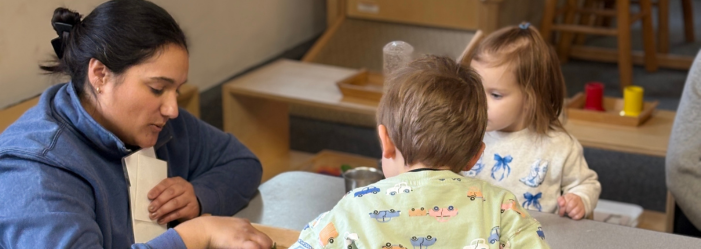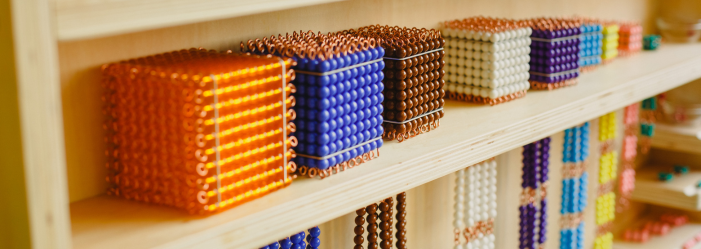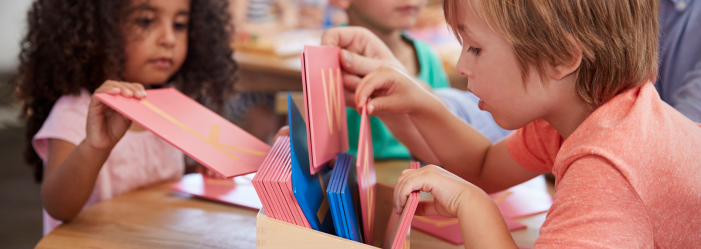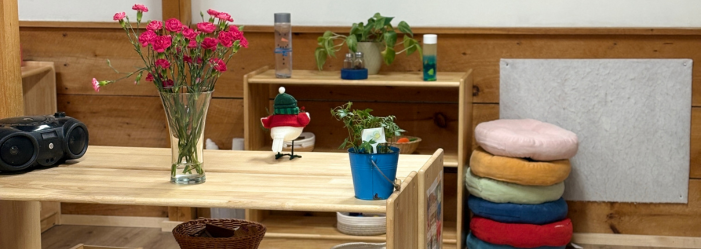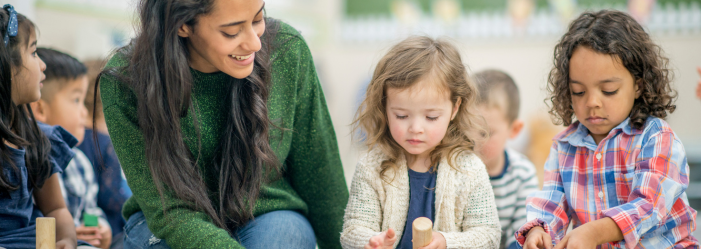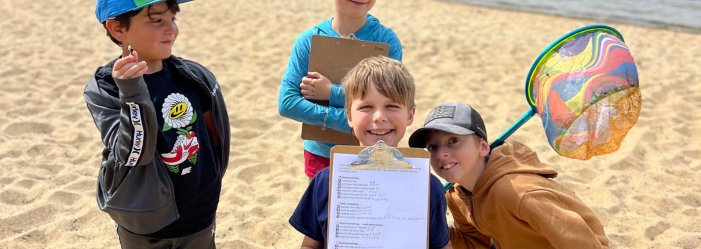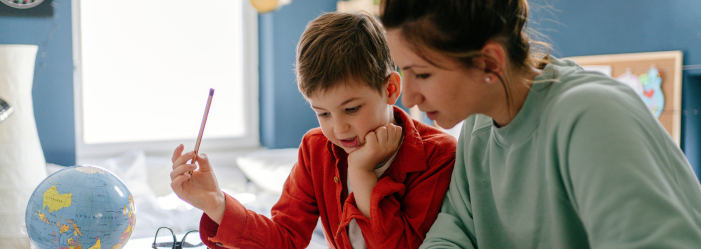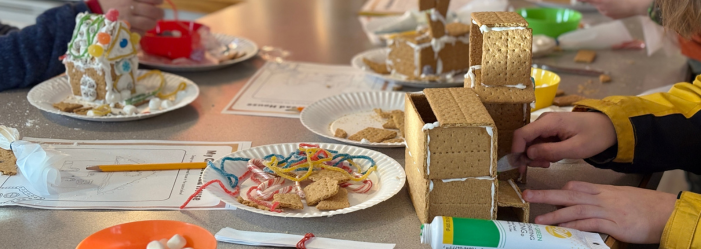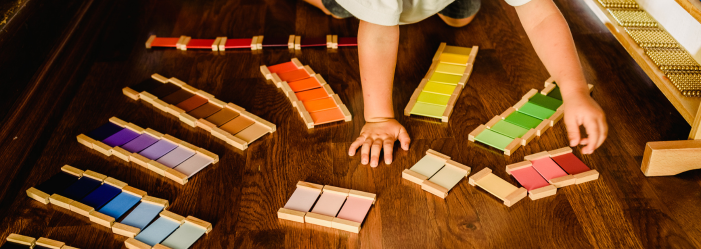More Than a Game: Dungeons and Dragons for Kids and the Lessons It Teaches
More Than a Game: Dungeons and Dragons for Kids and the Lessons It Teaches
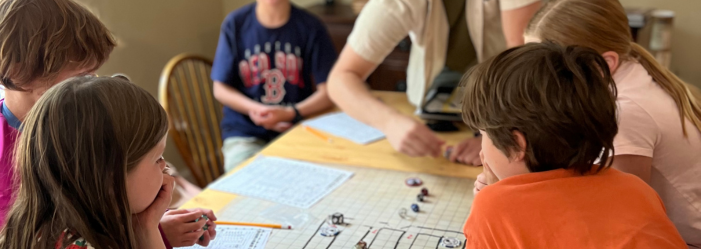
Most parents picture Dungeons & Dragons as a game for teens gathered around a table with snacks and a stack of dice, not something children might encounter in a classroom or homeschool enrichment setting.
In reality, Dungeons and Dragons for Kids offers rich opportunities for imagination, collaboration, and problem-solving. It’s one of those rare activities that blends play and purpose in a way that’s both joyful and deeply educational.
Let’s take a closer look at how this imaginative game becomes a powerful way for children to think critically, communicate clearly, and grow in confidence, all while having a whole lot of fun.
In every way, D&D mirrors what we value most in Montessori learning, children following their curiosity, engaging with peers, and developing skills that grow from meaningful experience rather than rote instruction.
Storytelling and Imagination Come Alive
Every D&D session begins with imagination. Children build worlds, create characters, and co-author stories that are as unique as they are. They practice the art of language by describing settings, expressing emotions, and weaving together narratives of their characters, the lands they come from, and the adventures they encounter.
These aren’t worksheets or memorized facts, they’re living stories where students think critically as they engage with one another. When a child decides how their character responds to a challenge, they’re practicing empathy as they step into someone else’s perspective and make choices that reveal their growing sense of self.
In true Montessori spirit, the experience is self-directed, hands-on, and creative. The child isn’t told what to think, they’re invited into a prepared environment to learn and explore and extend their thinking. Our D&D sessions aren’t any different. Our Dungeon Master expertly prepares an experience that engages our students to imagine, explore, and build through highly engaging creative learning experiences.
In our school’s program, you might hear a student narrate an entire scene from the viewpoint of a woodland ranger or invent an elaborate puzzle for their friends to solve. Others illustrate their characters or write “backstory journals” that connect literacy and art. We often see children who were hesitant to write or speak in front of a group suddenly eager to share their character’s next move. The stories become a bridge to language, and imagination becomes the spark that lights learning. Even our emergent readers and writers have full access to engage in this complex thinking and add their insight into the continually evolving world.
What makes this kind of learning so powerful is that it connects reading, writing, and oral language in one experience. When children say their ideas out loud before writing them, or act them out before illustrating them, they’re reinforcing comprehension, sequencing, and vocabulary in authentic ways. In the Montessori approach, this is how literacy grows best . . . through meaning-making, not memorization.
Collaboration and Communication
In a Dungeons & Dragons adventure, success depends on teamwork. Players must listen carefully, share ideas, and make decisions together. Negotiating with a dragon becomes a lesson in persuasion and respect. Planning a group strategy becomes a practice in trust and cooperation.
These moments mirror the kind of social learning we strive for in every classroom and homeschool community where listening, compromising, and finding solutions together anchor the experiences. As children play, they’re strengthening the same communication and collaboration skills they’ll use throughout their lives.
Within our enrichment group, you’ll often see children pausing to clarify one another’s ideas or voting on which path to take next. There’s laughter, negotiation, and the occasional playful debate all rooted in mutual respect. It becomes real-world communication wrapped in the joy of storytelling, and it makes it easy to get the entire group engaged.
Underneath the fun, children are also practicing emotional regulation and social awareness. They learn to wait their turn, negotiate tone, and notice how their words affect others, all essential elements of peace education and essential for thriving in today’s world. The group table becomes a miniature community, where respect and empathy are lived, not lectured.
For homeschool families, this group dynamic is especially valuable. Many children who learn at home thrive academically, but crave opportunities for authentic collaboration. D&D creates a natural context for that in a space where ideas flow freely, where children practice articulating thoughts clearly, and where everyone’s contribution matters.
Critical Thinking and Problem-Solving
Every quest in D&D is filled with puzzles, choices, and unexpected twists. Children learn to think several steps ahead, predict outcomes, and adapt when things don’t go as planned. It’s strategic thinking disguised as play.
These adventures nurture executive function skills. These are the mental processes that help children plan, organize, focus attention, and manage challenges. Executive function skills what help them tackle multi-step math problems, keep track of their school projects, or navigate social dynamics. When kids roll the dice and face an unexpected setback, they learn to pause, regroup, and try again. That simple act of recalibrating builds both perseverance and emotional regulation . . . the quiet, essential parts of resilience that matter long after the game ends.
Research in cognitive science shows that experiences like this, where the brain must predict, plan, and adapt, are what strengthen neural pathways for flexible thinking. Montessori called this “the work of adaptation.” Through each unexpected twist in the game, children are literally wiring their brains for problem-solving in life.
We’ve seen students calculate probabilities on the fly, invent new tools from limited resources, or creatively use their character’s skills to navigate complex challenges. These experiences stretch both sides of the brain: imagination and logic. And because the game’s outcomes depend on collective thinking, students learn to analyze cause and effect together, one of the most powerful forms of
critical learning.
For parents, this translates beautifully into daily life. A child who learns to pause and plan before acting in a game often carries that same mindset into their schoolwork, their chores, and even their friendships.
Confidence and Leadership
One of the most remarkable transformations happens when children realize that leadership takes many forms. In Dungeons & Dragons, there’s often one Dungeon Master guiding the adventure, but every player has opportunities to lead, collaborate, and influence the story in their own way.
Some children take on the role of Dungeon Master, weaving the storyline, managing the group’s choices, and setting the tone. Others lead by strategizing during challenges, encouraging teammates, or finding creative solutions when the group gets stuck. One child might organize supplies and keep track of character notes; another might inspire the group by bringing humor or empathy into tense moments. Each role matters, and each reveals a different kind of strength.
In this way, D&D becomes a living practice in shared leadership. Children learn that leading doesn’t always mean being in charge, it means knowing when to step forward, when to listen, and how to bring out the best in others.
Over time, players begin to see themselves differently. Shy students start speaking with confidence; natural leaders learn to pause and listen. The game builds organization, empathy, and communication skills in a safe, imaginative setting, and those lessons extend far beyond the game table into classrooms, friendships, and family life.
In Montessori education, we often say that leadership is service in action. The Dungeon Master doesn’t dominate the group; they hold space for others to contribute, much like a guide in the classroom. The same principle applies to every player: influence grows from empathy, not authority, and the best leaders help others shine.
For our local homeschool families on Cape Cod, this shared approach to leadership feels natural and inclusive. Whether children join for a single session or an entire season, they’ll find a space to belong, a story to shape, and many ways to practice leadership from within the adventure.
Huge Benefits and Why They Last
The deeper magic of Dungeons & Dragons for Kids lies in what remains long after the adventure ends. Long after the last dice roll, children carry forward the habits of curiosity, communication, and collaboration that grew around the table. Every quest becomes practice for real life . . . learning to lead, listen, and adapt with grace.
These are the same qualities we nurture in our Montessori classrooms every day: trust, empathy, adaptability, and a quiet confidence that comes from meaningful work. In D&D, those lessons are woven into the play itself. The game asks children to think critically, express themselves clearly, and solve problems creatively, all within a shared story that depends on cooperation and respect.
The benefits stretch far beyond academics.
Dungeons & Dragons for kids builds teamwork, persistence, and empathy, the very skills that support lifelong learning and emotional well-being. It’s also an unplugged, face-to-face experience that draws children into the joy of imagination and friendship, reminding us that true growth happens in connection, not isolation.
This alignment with Montessori philosophy is what makes it so powerful. There’s a clear structure, a framework of rules and systems, and within it, enormous freedom. Children operate independently within shared limits, making choices that shape collective outcomes. It’s
“freedom within limits” come to life: order without rigidity, creativity grounded in purpose.
So while it may look like a game, it’s actually a living example of what happens when play, purpose, and learning converge. The lessons linger because they are felt, not forced.
For families, the takeaway is simple yet profound: learning that feels like play lasts longer because it engages the heart as much as the mind. When curiosity drives the process, retention and joy follow naturally. That’s the secret behind both D&D and Montessori. . . the understanding that joy is not a distraction from learning; it’s the engine that powers it. And when joy drives learning, it naturally spills into home life through conversations, shared ideas, and imaginative play that keeps the learning alive.
As parents and educators, we often wonder how to extend these powerful learning moments beyond the classroom or the game table. Luckily, the lessons of D&D translate beautifully into family life.
Bringing the Adventure Home
Homeschool families often ask, “What can we do at home to build on this kind of growth?” The answer is simpler than most expect.
Here are a few easy ways:
- Encourage storytelling games or “choose-your-own-adventure” books that allow children to make creative choices.
- Use timers or visual schedules to help children stay focused during creative play or project work.
- Try a family D&D night and let your child take the lead as storyteller or guide. They’ll love being the one to create the world for you.
- Add journaling or sketching afterward so children can reflect on their story’s choices, developing both writing and metacognition.
- Join our Dungeons & Dragons enrichment course at Sandwich Montessori! Our rolling enrollment model means students can jump in at any time, and there’s never a sense of being “behind.” Every new player adds to the story, bringing fresh ideas and perspectives that keep the adventure alive.
These small moments invite children to practice independence, communication, and imagination every day, with no screens required. They also remind families that learning doesn’t have to look formal to be meaningful. The best lessons often happen around the kitchen table, in the car, or during play.
You don’t need elaborate materials to make home a place of deep learning. Montessori reminds us that the environment teaches. When families slow down, create space for imagination, and allow children to take ownership of the process, that environment becomes a “prepared home” for creativity and connection.
Dungeons and Dragons for Kids on Cape Cod
At Sandwich Montessori School, our Dungeons & Dragons (D&D) for Kids program is far more than a fantasy game. It’s a hands-on lesson in creativity, collaboration, and confidence that captures the very heart of Montessori and classical education: learning through curiosity, story, and community.
The program is part of our broader commitment to nurturing curiosity and independent thinking. It was intentionally designed so that homeschool families can easily join our enrichment community . . . whether as a supplement to home learning or as a consistent weekly connection point with peers.
Here on Cape Cod, our D&D
enrichment sessions welcome elementary and middle school students who are eager for meaningful, in-person learning experiences that build both skills and friendships. Each week, students gather around the table not just to play, but to imagine, create, and grow. Some come because they love fantasy stories or role-playing; others are drawn in by math, logic, or problem-solving. All of them leave a little more confident, a little more connected, and a lot more inspired.
Join the Adventure
Our Dungeons & Dragons enrichment program is open to homeschool and community families of children in elementary through middle school who want their children to experience creative collaboration in a joyful, structured way.
Through storytelling, teamwork, and play, children build skills that matter in every aspect of life, all while discovering the magic of learning together.
Whether your child dreams of being a wizard, a healer, or a brave adventurer, they’ll find a place at the table where imagination leads the way. The greatest adventures aren’t found in distant lands, they’re built right here, through shared stories, laughter, and imagination that remind children what it means to belong and believe in themselves.
- Learn more about our Elementary and Middle School Programs
- Explore our Dungeons & Dragons Enrichment Program

